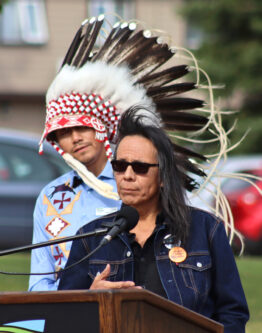Coulee Walk points to natural world as ‘foundation of knowledge’
By Al Beeber on September 29, 2021.
 Herald photo by Al Beeber -
William Singer III speaks at the opening of the Coming to Know and Learn Coulee Walk at Lethbridge College Tuesday as Indigenous Cultural and Curriculum advisor Lowell Yellowhorn looks on.
Herald photo by Al Beeber -
William Singer III speaks at the opening of the Coming to Know and Learn Coulee Walk at Lethbridge College Tuesday as Indigenous Cultural and Curriculum advisor Lowell Yellowhorn looks on.LETHBRIDGE HERALDabeeber@lethbridgeherald.com
Perhaps it was only fitting Mother Nature greeted the unveiling of a new coulee walk at Lethbridge College Tuesday morning with howling winds screaming across the river valley.
The Iissksiniip (Coming to Know and Learn) coulee walk was created by Blackfoot artist and plant knowledge keeper William Singer III (Api’soomaahka – Running Coyote). It is a self-guided interpretive tour that explores traditional plants as well as their uses while sharing some traditional creation stories of the Blackfoot Confederacy.
Numerous dignitaries addressed a large crowd of students and others, including Singer who spoke briefly of his time in the residential school system and shared his thoughts on the role of humans as stewards of the land.
He said the residential school system never took the Indigenous out of him and “we are still here today.”
Singer is a professional artist and illustrator whose work is rooted in the Blackfoot culture. He is also an entrepreneur and political activist.
“The natural world is the foundation of knowledge that connects all life,” said Singer. “You feel it and experience it every time you look at” the land, he said.
The walk starts behind the Cullen Residence buildings on the west side of the college and goes around the coulees along a popular walking trail. The walk is an extension of the college’s focus on the indigenization of campus spaces.
“It was our vision to build on our collective story of what it means to reside on Blackfoot territory and the importance of sharing a cultural narrative that strengthens our relations and understanding of living in harmony with our Indigenous communities and the land that sustains us all,” said LC manager of Indigenous Services Shanda Webber.
“We invite you to reflect on how your shared connections to the land with the plants, the animals . . .and each other will bring together our spirits and reconciliation,” Webber told the crowd.
She gave thanks and appreciation to Singer.
“You’re truly one of the most kind, genuine, compassionate and humblest souls I know, a true leader, mentor and knowledge keeper of the Blackfoot traditional plants, an advocate of environment issues and a true steward of the land,” Webber said of Singer.
“An individual who has turned his own home into Napi’s garden, who has dedicated his whole life to taking care of our traditional plants and seeds for future generations to come. Thank you, William, from the bottom of my heart for your friendship, your kindness and for your generosity of sharing your knowledge and teachings with each and every one of us and for future generations to come.
“The natural world is the foundation of knowledge that connects all life, she said, quoting Singer.
“You can feel it definitely today and experience it every time you look at nature or what we refer to as the earth. It’s what we live on and it’s what we have a chance to make a connection now more than ever. William and our grandparents teach us we do not own the land but we are a part of it. It is our role to honour and be stewards of the land as well as to respect and care for the environment,” Webber said.
The vision of the project was to “build on the story of what it means to reside on Blackfoot territory and the importance of sharing a cultural narrative that strengthens our relations and understanding of living in harmony with our Indigenous communities and the land that sustains us all,” says Webber on the college’s website.
Peter Weasel Moccasin, who gave the opening invocation, said he was in residential schools 60 years ago and said “I saw things no child should ever see in their lives,” adding “I will live with this pain until I die.”
He also said forgiveness has allowed him to move on with his life. He spoke of seeing his 100-year-old grandfather ride a horse like a young man and that he is “grateful and thankful for what we go through in life. I’m very honoured to help many young people learn what life is about,” he said adding the stories of the Blackfoot are told through an oral history.
He spoke of the strength of his ancestors who survived harsh times with no computers or GPS to help them.
“We’re still here today because of their strength and intelligence,” he told the audience.
He said 60 years ago he was forbidden to speak his own language and today while his children and grandchildren are well-educated, they’ve lost their native tongue.
Weasel Moccasin said the Blackfoot are spiritually connected to the land and their creator said to be unselfish with it, citing the importance of peoples to co-exist.
“We are unselfish people, we are always going to share,” Weasel Moccasin said before making the audience laugh with advice his father gave him:
“Enjoy life, my son and if you can’t enjoy life, keep your damn mouth shut!”
Follow @albeebHerald on Twitter
4-3




